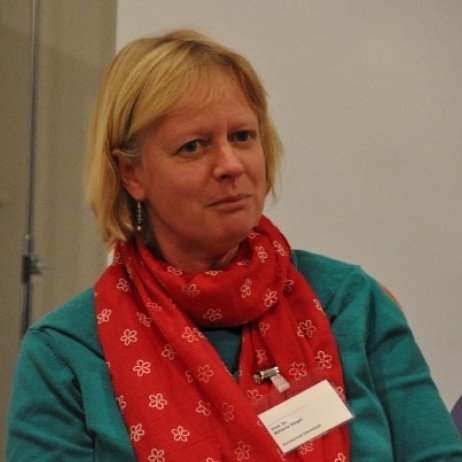Keynote Speaker I

Prof. Melanie Siegel, University of Applied Sciences, Germany
Dr. Siegel is Professor for Semantic Technologies at Darmstadt University of Applied Sciences. She holds a Ph. D. and a Habilitation from Bielefeld University in computational linguistics and language technology. She has worked for ten years at the German Research Centre for Artificial Intelligence in the language technology research lab and six years in a language technology software company.
Speech: Methods for the Automatic Classification of Hate Speech Comments
Data forms the basis of any automatic text classification. Therefore, the presentation will first deal with what data is used, how it is generated, and how bias in the data can be avoided as far as possible. The next step is to define the classification task: we will show what else is possible and useful besides classifying comments as ‘hate speech or not’. The classic methods of automatic classification with supervised learning will be briefly outlined before we turn our attention to the use of generative language models. These can be used for various tasks, such as data creation for classification, the detection of automatically generated hate comments, and the classification of hate comments. Experiments from the ‘BoTox’ project with zero-shot learning and few-shot learning will be presented. The lecture concludes with an overview of the potential and limitations of using generative language models for these tasks.
Keynote Speaker II

Prof. Peter Kropf, University of Neuchatel, Switzerland
Peter Kropf has received his diploma (lic. phil. nat) in mathematics and his Ph.D. degrees in Computer Science from the University of Bern, Switzerland. From 1994 to 1999, he has been an assistant and associate professor at Laval University, Quebec, Canada. Thereafter he was appointed as an associate professor at the department of computer science and operations research (DIRO) at University of Montreal, Canada. In 2001 he introduced the first (French) Master's program in e-commerce with an interdisciplinary approach (computer science, management and law). Since October 2003, he is a Professor and head of Department at the Computer Science Department at the University of Neuchâtel, Switzerland. From 2010 to 2014 Peter Kropf was appointed Dean of the Faculty of science. Furthemore, he is a member of the Centre of competence of Complex Systems and Big Data as well as of the the Interuniversity Research Centre of Enterprise Networks, Logistics and Transportation (CIRRELT), Montreal. He has published over 120 research papers in the field of parallel and distributed systems, simulation and optimisation.
Speech: Language, Models, Generative AI Technology
With ChatGPT and DeepSeek models, AI generative technology has demonstrated its ability to understand user queries and to write human-like messages. Recently, various large language models (LLMs) have gained significant momentum. This approach and associated models shall be discussed. In recent contexts, generated and real speeches shall be analysed. After discussing the main issues related to NLP and IR, this presentation will focus on generative AI and its next advances. Various properties including credibility of generated text, its meaning in different contexts and types and characteristics of IR approaches will be discussed. Finally, could generative AI thus become a ghostwriter for any politician, manager or teacher?
Keynote Speaker III

Assoc. Prof. Dr. Anirach Mingkhwan, King Mongkut's University of Technology North Bangkok, Thailand
Assoc. Prof. Dr. Anirach Mingkhwan is a researcher and lecturer in the Department of Information Technology, Faculty of Industrial Technology and Management, King Mongkut's University of Technology North Bangkok (KMUTNB). He specializes in AI Engineering, with research interests spanning Artificial Intelligence, Big Data Analytics, Cloud Computing, Knowledge Management, and Nature-Inspired Computing. From 2012 to 2020, he served as Dean of the faculty, driving innovation in curriculum design and research development.
Dr. Mingkhwan has led multiple interdisciplinary research projects focused on intelligent system design and data-driven technologies. His work has been widely published and is accessible through platforms such as Google Scholar. As a mentor and academic leader, he continues to shape Thailand’s technological education landscape and contribute to global AI research.
Speech: From Hypothesis to Prototype: Accelerating NLP Research with Vibe Coding
This talk provides a practical introduction to Vibe Coding, an agile, iterative development approach designed to assist researchers in translating NLP hypotheses into functional prototypes. Instead of offering a one-size-fits-all solution, Vibe Coding is presented as a flexible framework that can help streamline the processes of hypothesis formulation, model implementation, and empirical evaluation—particularly in applied research settings.
To illustrate its potential, the talk draws on a case study exploring the hypothesis: “Transformer-based language models can significantly improve the detection of misinformation in short-form social media posts compared to traditional keyword-based classifiers.” The session walks through how Vibe Coding structures the workflow into manageable development sprints, enables integration with pre-trained models such as BERT and RoBERTa, and supports comparative evaluation using real datasets and explainability tools.
The emphasis is not on proving a particular research outcome, but on demonstrating how Vibe Coding can make the research process more approachable, reproducible, and adaptable. Attendees will take away ideas on how to use this method to explore their own NLP questions with greater clarity and efficiency. This talk may be of interest to researchers, students, and practitioners who are looking for lightweight, practical strategies to bridge theory and experimentation in NLP work.
